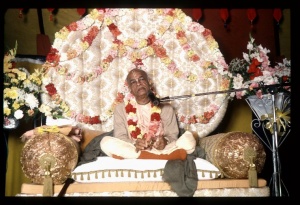CC Madhya 3.99: Difference between revisions
m (1 revision(s)) |
(Vanibot #0054 edit - transform synonyms into clickable links, which search similar occurrences) |
||
| (One intermediate revision by one other user not shown) | |||
| Line 1: | Line 1: | ||
{{ | [[Category:Sri Caitanya-caritamrta - Madhya-lila Chapter 03|C099]] | ||
<div style="float:left">'''[[Sri Caitanya-caritamrta|Śrī Caitanya-caritāmṛta]] - [[CC Madhya|Madhya-līlā]] - [[CC Madhya 3|Chapter 3: Lord Śrī Caitanya Mahāprabhu's Stay at the House of Advaita Acārya]]'''</div> | |||
<div style="float:right">[[File:Go-previous.png|link=CC Madhya 3.98|Madhya-līlā 3.98]] '''[[CC Madhya 3.98|Madhya-līlā 3.98]] - [[CC Madhya 3.100|Madhya-līlā 3.100]]''' [[File:Go-next.png|link=CC Madhya 3.100|Madhya-līlā 3.100]]</div> | |||
{{CompareVersions|CC|Madhya 3.99|CC 1975|CC 1996}} | |||
{{RandomImage}} | |||
==== TEXT 99 ==== | ==== TEXT 99 ==== | ||
<div | <div class="verse"> | ||
nityānanda bale,—ei kṛṣṇera prasāda | :nityānanda bale,—ei kṛṣṇera prasāda | ||
ihāke ‘jhuṭhā’ kahile, tumi kaile aparādha | :ihāke ‘jhuṭhā’ kahile, tumi kaile aparādha | ||
</div> | </div> | ||
| Line 12: | Line 16: | ||
==== SYNONYMS ==== | ==== SYNONYMS ==== | ||
<div | <div class="synonyms"> | ||
nityānanda | ''[//vanipedia.org/wiki/Special:VaniSearch?s=nityānanda&tab=syno_o&ds=1 nityānanda] [//vanipedia.org/wiki/Special:VaniSearch?s=bale&tab=syno_o&ds=1 bale]'' — Lord Nityānanda said; ''[//vanipedia.org/wiki/Special:VaniSearch?s=ei&tab=syno_o&ds=1 ei]'' — this; ''[//vanipedia.org/wiki/Special:VaniSearch?s=kṛṣṇera&tab=syno_o&ds=1 kṛṣṇera] [//vanipedia.org/wiki/Special:VaniSearch?s=prasāda&tab=syno_o&ds=1 prasāda]'' — ''mahā—prasādam'' of Lord Kṛṣṇa; ''[//vanipedia.org/wiki/Special:VaniSearch?s=ihāke&tab=syno_o&ds=1 ihāke]'' — unto it; ''[//vanipedia.org/wiki/Special:VaniSearch?s=jhuṭhā&tab=syno_o&ds=1 jhuṭhā]'' — remnants of food; ''[//vanipedia.org/wiki/Special:VaniSearch?s=kahile&tab=syno_o&ds=1 kahile]'' — if You say; ''[//vanipedia.org/wiki/Special:VaniSearch?s=tumi&tab=syno_o&ds=1 tumi]'' — You; ''[//vanipedia.org/wiki/Special:VaniSearch?s=kaile&tab=syno_o&ds=1 kaile]'' — have made; ''[//vanipedia.org/wiki/Special:VaniSearch?s=aparādha&tab=syno_o&ds=1 aparādha]'' — offense. | ||
</div> | </div> | ||
| Line 19: | Line 23: | ||
==== TRANSLATION ==== | ==== TRANSLATION ==== | ||
<div | <div class="translation"> | ||
Nityānanda Prabhu replied, “These are the remnants of food left by Lord Kṛṣṇa. If You take them to be ordinary remnants, You have committed an offense.” | Nityānanda Prabhu replied, “These are the remnants of food left by Lord Kṛṣṇa. If You take them to be ordinary remnants, You have committed an offense.” | ||
</div> | </div> | ||
| Line 26: | Line 30: | ||
==== PURPORT ==== | ==== PURPORT ==== | ||
<div | <div class="purport"> | ||
In the Bṛhad-viṣṇu Purāṇa it is stated that one who considers mahā-prasādam to be equal to ordinary rice and dhal certainly commits a great offense. Ordinary edibles are touchable and untouchable, but there are no such dualistic considerations where prasādam is concerned. Prasādam is transcendental, and there are no transformations or contaminations, just as there are no contaminations or transformations in the body of Lord Viṣṇu Himself. Thus even if one is a brāhmaṇa he is certain to be attacked by leprosy and bereft of all family members if he makes such dualistic considerations. Such an offender goes to hell, never to return. This is the injunction of the Bṛhad-viṣṇu Purāṇa. | In the ''Bṛhad-viṣṇu Purāṇa'' it is stated that one who considers ''mahā-prasādam'' to be equal to ordinary rice and dhal certainly commits a great offense. Ordinary edibles are touchable and untouchable, but there are no such dualistic considerations where ''prasādam'' is concerned. ''Prasādam'' is transcendental, and there are no transformations or contaminations, just as there are no contaminations or transformations in the body of Lord Viṣṇu Himself. Thus even if one is a ''brāhmaṇa'' he is certain to be attacked by leprosy and bereft of all family members if he makes such dualistic considerations. Such an offender goes to hell, never to return. This is the injunction of the ''Bṛhad-viṣṇu Purāṇa''. | ||
</div> | </div> | ||
__NOTOC__ | |||
<div style="float:right; clear:both;">[[File:Go-previous.png|link=CC Madhya 3.98|Madhya-līlā 3.98]] '''[[CC Madhya 3.98|Madhya-līlā 3.98]] - [[CC Madhya 3.100|Madhya-līlā 3.100]]''' [[File:Go-next.png|link=CC Madhya 3.100|Madhya-līlā 3.100]]</div> | |||
__NOTOC__ | |||
__NOEDITSECTION__ | |||
Latest revision as of 23:26, 19 February 2024

A.C. Bhaktivedanta Swami Prabhupada
TEXT 99
- nityānanda bale,—ei kṛṣṇera prasāda
- ihāke ‘jhuṭhā’ kahile, tumi kaile aparādha
SYNONYMS
nityānanda bale — Lord Nityānanda said; ei — this; kṛṣṇera prasāda — mahā—prasādam of Lord Kṛṣṇa; ihāke — unto it; jhuṭhā — remnants of food; kahile — if You say; tumi — You; kaile — have made; aparādha — offense.
TRANSLATION
Nityānanda Prabhu replied, “These are the remnants of food left by Lord Kṛṣṇa. If You take them to be ordinary remnants, You have committed an offense.”
PURPORT
In the Bṛhad-viṣṇu Purāṇa it is stated that one who considers mahā-prasādam to be equal to ordinary rice and dhal certainly commits a great offense. Ordinary edibles are touchable and untouchable, but there are no such dualistic considerations where prasādam is concerned. Prasādam is transcendental, and there are no transformations or contaminations, just as there are no contaminations or transformations in the body of Lord Viṣṇu Himself. Thus even if one is a brāhmaṇa he is certain to be attacked by leprosy and bereft of all family members if he makes such dualistic considerations. Such an offender goes to hell, never to return. This is the injunction of the Bṛhad-viṣṇu Purāṇa.